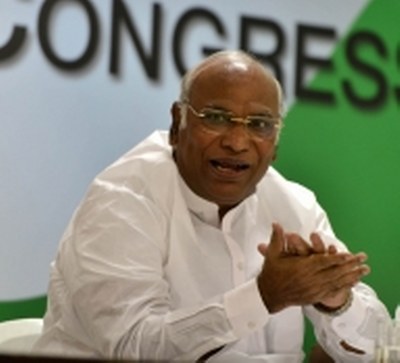Congress leader Mallikarjun Kharge moves SC to quash CVC order against CBI Director

Leader of the Congress in the Lok Sabha Mallikarjun Kharge (Photo : IANS)
Leader of the Congress in the Lok Sabha Mallikarjun Kharge (Photo : IANS)
New Delhi : Congress leader Mallikarjun Kharge on Saturday moved an application in the Supreme Court requesting it to quash the separate orders of Central Vigilance Commission (CVC) and Ministry of Personnel issued on October 23 that divested CBI Director Alok Verma of his powers, saying the move was “completely illegal, arbitrary and without jurisdiction”.
Kharge’s application said the orders violated the powers conferred upon the Statutory Committee — a three-member panel comprising Prime Minister, Chief Justice of India and Leader of Opposition — under Section 4A of the Delhi Special Police Establishment (DSPE) Act 1946.
Kharge, who is also on the Statutory Committee, said the DSPE Act provides that the Director of Central Bureau of Investigation (CBI) shall be appointed on the recommendation of the committee and transferred also only with its consent.
“Filed a petition before Supreme Court requesting it to quash order of Centre because it is illegal… They should have called meeting of all — Prime Minister, Chief Justice of India and me. Without any meeting, without committee’s consent, they overnight asked him (CBI Director) to go on leave indefinitely,” Kharge said.
The Lok Sabha MP said the orders were in “violation of Central Bureau of Investigation Act” and alleged that the CVC also violated rules by asking Verma to go on leave.
“Violation is there and it’s clearly PMO’s direct involvement in autonomous bodies. So, I have challenged that and filed a petition before Supreme Court. Let’s see what happens.”
The Congress leader referred to the apex court’s observation in Vineet Narain vs Union of India (1998) case wherein, he said, it was held that recommendations for appointment of the CBI Director shall be made by a committee headed by the Central Vigilance Commissioner with the Home Secretary and Secretary (Personnel) as its members.
“The Supreme Court in Vineet Narain’s case unequivocally observed that holders of public office are entrusted with powers which have to be exercised in public trust… Accordingly, this court was pleased to pass directions for effective functioning and independence of the CBI and the CVC.”
Kharge also sought to be impleaded as an intervenor in the plea moved by Verma challenging his removal.
On October 23, while CBI Director Verma was divested of his powers by orders of the CVC as well as the Central government, Special Director Rakesh Asthana was sent on leave and the interim charge of the Director’s office was assigned to the Joint Director M. Nageshwar Rao.
On October 24, Verma had challenged Centre’s decision to remove him as the Director of CBI, stating that investigating officers of sensitive cases are being changed. Asthana had also moved the Delhi High Court challenging the FIR registered against him in the bribery case.
Subsequently, on October 26, the apex court issued a string of interim measures wherein it directed that the inquiry in respect of the allegations made in the note of Cabinet Secretary be completed by the CVC within two weeks.
Published on : Nov 3, 2018 at 18:07 IST
IANS




